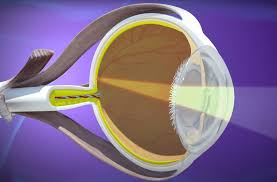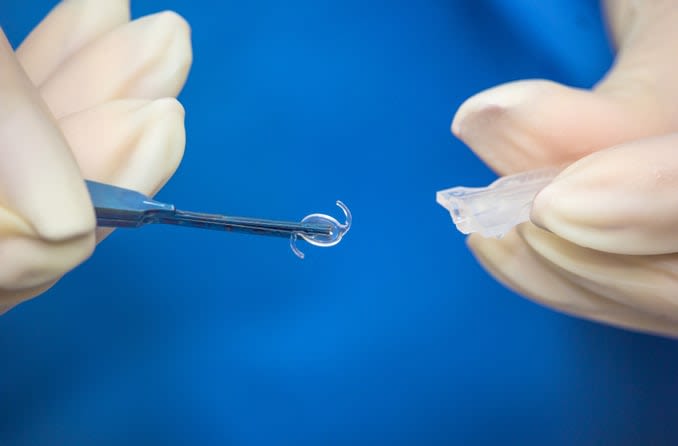If you are one of the millions of people who suffer from cataracts, then you know that surgery is the only way to correct the problem. But what many people don’t know is that there are different types of lenses available for cataract surgery.
When looking for an eye doctor, one of the first questions they’ll ask you is which type of lens implant you’d like. There are a few options to choose from Crystalens, Tecnis Multifocal, and ReSTOR. They all have their own pros and cons, but in this article, we’ll help guide you on which is the best lens for cataract surgery for your needs. In this blog post, we will discuss the different types of lenses and help you choose the best lens for your needs!
Contents
What Is a Lens?

The lens of the eye is a transparent structure that helps focus light on the retina. It is responsible for forming an image of what we see and transmitting it to the brain through the optic nerve. The natural lens, which is made up mostly of water and proteins, can become cloudy or develop cataracts with age, leading to vision loss. Cataract surgery is a procedure to remove the cloudy lens and replace it with an artificial intraocular lens (IOL).
Different Types Of Lens For Cataract surgery
Choosing the best lens for cataract surgery can be a daunting task. There are many different types of lenses available and understanding your options is key to achieving excellent vision after your procedure. Here is a guide to the different types of IOLs and how you can choose the best one for your situation.
Monofocal lenses
They are the most commonly used type of IOL, as they provide excellent vision at a single distance (usually far away). Monofocal lenses are designed to correct moderate levels of nearsightedness, farsightedness, and astigmatism. They also provide good night vision but may require glasses for near and intermediate activities such as reading or computer use.
Toric lenses
The toric lens is designed to correct astigmatism, a common imperfection of the eye’s curvature. It has two axis powers that allow it to focus light in both meridians. Toric lenses are usually used in cases of cataract surgery when significant astigmatism is present. They are designed to provide both distance and near vision for those with astigmatism-related visual impairment.
When choosing a toric lens, your eye care provider will consider the amount of astigmatism present in order to determine which type of toric lens is best for you. Toric lenses also come in a variety of materials including monofocal, multifocal, and trifocal. Monofocal lenses have just one distance correction while multifocal and trifocal lenses offer multiple focal points for both near and far vision.
Multifocal lenses
These lenses are designed with multiple focusing powers, so you may not need to wear glasses at all after surgery. However, these lenses can produce a halo effect around lights and they cost more than Monofocal or Toric IOLs.
Your eye care provider may also suggest a special type of toric lens called an aspheric lens. These lenses are designed with a different curvature than traditional lenses to offer an improved range of vision. Aspheric lenses are ideal for patients who need a wide field of view, or those with higher levels of astigmatism.
No matter the type of toric lens you choose, it is important that your eye care provider select one that will provide the best vision correction possible while also being comfortable and stable. Your eye doctor will be able to explain the different types of toric lenses and make sure you get the one that is best for your situation.
Types of cataract surgery
There are three types of cataract surgery: phacoemulsification, extracapsular, and intracapsular.
Phacoemulsification
They are also called microincision cataract surgery (MICS), which is the most common type of cataract surgery. It is performed through a tiny incision, about 2.2 mm in width. A small probe is inserted through the incision and used to break up the cataract into pieces so it can be suctioned out of the eye. This type of surgery has a shorter recovery time and fewer complications than other types of cataract surgery.
Extracapsular surgery
They are performed through a larger incision, about 5-6 mm in width. The surgeon removes the entire lens capsule, which contains the cataract. The lens is then replaced with an intraocular lens (IOL). This type of surgery has a longer recovery time and more potential complications than MICS.
Intracapsular surgery
also called en bloc removal, is the most invasive type of cataract surgery. It is performed through an incision that is 10-12 mm in width. The surgeon removes the entire lens along with the lens capsule. This type of surgery has a longer recovery time and more potential complications than MICS or extracapsular surgery.
The best type of lens for you will depend on your individual circumstances. Your doctor will discuss the best option for you based on your age, health, and the severity of your cataracts.
Cataract surgery is a safe and effective way to treat cataracts. Complications from surgery are rare, but can include infection, bleeding, and retinal detachment.
Which Is The Best Lens For Cataract surgery?
So which type of lens is the best for you? It really depends on your individual needs and lifestyle. If you have a job that requires you to be up close to your computer screen or work with small objects, you may want to consider a multifocal or accommodating IOL. If you enjoy activities like reading, knitting, or working on hobbies that require fine detail, monofocal IOLs can give you the best results. Ultimately, your surgeon will help you decide which type of lens is best for you based on a number of factors including your age, health history, and lifestyle.
Monofocal lens
These implants are usually the most common type of lens implant used in cataract surgery. Monofocal lenses offer high-quality vision and can provide good distance vision for activities such as driving, but require additional glasses for reading or computer work.
Multifocal lenses
They are a newer option that provides both near and far vision without the need for glasses. These lenses are also known as “premium” or “advanced technology” lenses. The downside to these lenses is that they can be more expensive than monofocal lens implants, and you may still need glasses for certain tasks such as reading small print or working on the computer.
Toric lens implants
They are a specialized type of lens designed to correct astigmatism, as well as provide clear vision at both near and far distances. These lenses are often used when a patient has a high degree of astigmatism that is causing blurry vision or difficulty with night driving.
Accommodative IOLs
Accommodative IOLs are a more recent lens style. They can change shape or move in the eye in a way somewhat similar to a natural eye lens.
Because these are the most expensive type of IOL, many of them come with few disadvantages as well. Many people with accommodative lenses are able to go without glasses, but this can vary from person to person.
How To Choose The Best Lens for Cataract Surgery?
The best lens implant for you will depend on your individual needs and circumstances.
Choosing the right lens for cataract surgery is an important decision that affects both your vision and your overall health. The type of lens used can have a direct effect on how well you see after the procedure, as well as influencing any potential side effects or risks associated with the operation. With so many different types of lenses available, the decision can be overwhelming.
Your ophthalmologist is the best person to help you choose the right lens for your cataract surgery. They will be able to assess your individual needs and recommend a lens that is appropriate for your specific condition. It’s important to discuss all of your options with them before making any decisions so that you can make an informed and educated choice.
Whether you choose a mono-focal, multifocal, or toric lens implant for cataract surgery, the goal is to provide you with the best possible vision outcomes. With careful selection and an experienced ophthalmologist, you can ensure that your new lens provides clear and comfortable vision for years to come.
What Is The Newest Cataract Lens?
Cataract surgery has recently been advanced by the inclusion of ORA (Optiwave Refractive Analysis)—a type of intraoperative aberrometry. This technology allows surgeons to take refractive measurements in the operating room, so as to ensure optimal lens power and placement.
How Long Do A Cataract Lenses Last?
A cataract lens will last a lifetime, and the vast majority of patients do not experience any complications with their lenses after cataract surgery. In fact, the most common post-cataract surgery issue has nothing to do with your lens in particular
Additionally, there are also presbyopia-correcting IOLs available to help you focus on objects both near and far away without glasses. Your surgeon can discuss all of your options with you so that you can make the best decision for your vision needs.
Conclusion
It may be concluded that the best lens for cataract surgery is dependent on a patient’s individual needs and preferences. Multifocal lens implants are preferred by those who do not want to rely on glasses for near and far vision, while the extended depth of focus lenses provide greater contrast sensitivity than standard mono-focal lenses. Ultimately, selecting the right IOL lens for cataract surgery is a personal decision and one that should be carefully considered.
By discussing the available options with your ophthalmologist, you can make an educated decision about which lens is best for your particular situation. With careful consideration, the right IOL lens choice for cataract surgery can improve your vision and quality of life.
Cataract surgery is a safe and painless procedure. At MantraCare we have a team of experienced eye surgeons, who will be happy to answer any questions on cataract surgery. Call us at +91-9711116605 for any inquiries.
